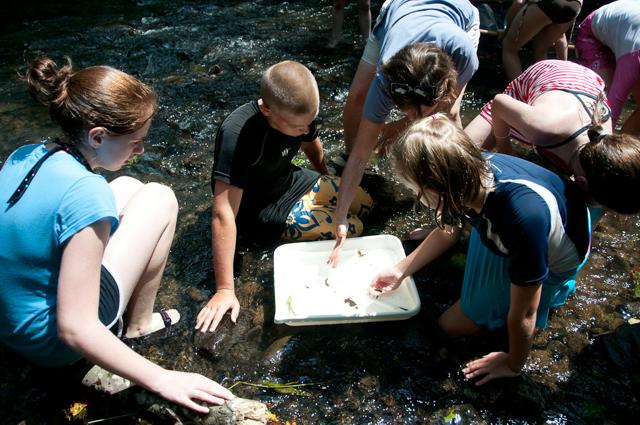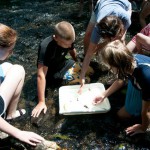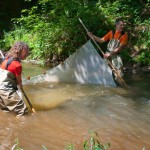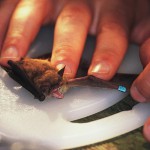- Getting their feet wet: The Western North Carolina Nature Center offers a hands-on approach to learning — which sometimes involves getting dirty. Photos copyright Kevin Fitzpatrick
Think back to the science classes you had when you were a kid. Mine conjure up the acrid smell of formaldehyde as my high-school biology classmates and I dissected enormous, pale, flatworms that seemed too otherworldly to slither on the earth.
Nature photographer Kevin W. FitzPatrick has a similarly uninspiring story.
"When I was a kid, you'd sit at a blackboard and you'd look at chemistry and physics and science, and if you weren't of a mind it was just — I don't want to think about it," he recalls.
Luckily, times have changed.
"If you know a bit about education, you know that more and more people are now taking their kids out into streams and into the forest and they're seeing it firsthand," he says.
The hands-on approach is the cornerstone of a summer day camp offered through the Western North Carolina Nature Center, as well as a budding year-round club sponsored by FitzPatrick, a board member of the Friends of the Western North Carolina Nature Center.
"The kids are just dying to get into science," FitzPatrick says.
2010 was the inaugural year for the day camp, in which 10 sixth- through ninth-graders gathered in a log cabin at the Nature Center for talks by scientists about their specialties. Then it was off to the nearby Swannanoa River or Trillium Trail for fieldwork.
Scientific collection methods are followed at the camp, though FitzPatrick notes that the insects, mollusks and other life forms are examined alive, then safely returned to their habitat.
One research method involved the campers marking off a plot of ground and studying all the diverse life forms they could find there.
"That made an impression on the kids," recalls Karen Boekschoten, whose 14-year-old son, Nico, an eighth-grader at Evergreen Community Charter School, was an enthusiastic participant.
Another day involved campers blocking off a small section of the Swannanoa River to learn about water quality and the fish, insects and other aquatic life that live there. In other sessions, a scientist brought along 15 or so cases of butterfly specimens, while a snake specialist toted along his own live snakes for the kids to handle.
"It was AMAZING!" 12-year-old Serena Morgan Dotson-Smith declares via e-mail. "I can't quite put the feeling of what walking in the stream, searching in the forest, and running with wolves was like! We all made great friends, learned some new scientific terms and plain-out just had fun! It was an experience not worth missing, in fact not worth trading for a thousand dollars!” (To clarify, the seventh-grader at North Buncombe Middle School notes that the kids ran on the outside of the wolf enclosure, while the wolves ran back and forth on the inside. One of the best parts of the camp, she adds, was meeting other people who shared her interest in wildlife.)
Once last summer's camp was over, the kids were hungry for more hands-on science. Those campers form the core of a nascent club that will meet once a month on weekends, following much the same format as the camp. (Though there's a fee for the summer camp, the club is free.)
FitzPatrick admits that the camp suffers from a somewhat unwieldy name: The ATBI (All Taxa Biodiversity Inventory) Camp, thanks to its connection to an ambitious scientific project in the Great Smoky Mountains National Park. Through the nonprofit organization Discover Life in America (based at the national park), the All Taxa Biodiversity Inventory seeks to identify and record all of the estimated 100,000 species in the park. So far, the project has discovered 903 species new to science, according to Discover Life in America's website (www.dlia.org/atbi/).
On a smaller scale, the ATBI database manager plans to work with Nico to create a mini database to document the species the kids find, which will help the club as well as serve as a school project for Nico.
"I guarantee you that there are species on that trail that have never been seen before," FitzPatrick says. Finding one, he adds, "would make our day."
Meanwhile, Dotson-Smith has launched the website for the ATBI Club (wncnaturecenteratbiclub.webs.com) and encourages other kids to get involved with the camp and club.
Apart from learning about, say, a specific species of dragonfly, this sort of environmental education yields less obvious benefits.
"It kind of deepens the kids' appreciation of where they live," Boekschoten says. "I think it also fosters stewardship of the environment, which is what it's all about."
The ATBI Camp runs June 20-24 and is just one of the nature-oriented Wild Weeks summer camps to be offered through the WNC Nature Center. For more info, visit wildwnc.org/education/summer-camp or call the Nature Center at (828) 298-5600. For more info on the ATBI club, contact Kevin FitzPatrick at kevinfp@gmail.com.
BOX:
Learning about nature = good times
Budding naturalists can indulge their interests through a cluster of camps in the Asheville area. The N.C. Arboretum offers a variety of nature-themed Discovery Camp programs for preschoolers through high-school students, including an intriguing Advanced Eco Detectives camp for second- and third-graders. For more info, see ncarboretum.org/education/discovery-camp or call (828) 665-2492.
And Bug Camp is back this summer at UNCA, although a funding shortage has downscaled it from a residential camp to a day camp, says UNCA biology professor Tim Forrest. Two sessions run June 20-24 and June 27-July 1, with a maximum of 20 students per camp. Bug Camp, free for rising sixth- through rising eighth-graders, involves working in the lab and the great outdoors — usually the national forest — where campers collect various insects for study the next day. They also run experiments in the field, including measuring the pulling force of beetles that live in logs, and then calculating what that force would equal for a child. “It turns out to be a Volkswagen microbus, pretty much,” Forrest says with a laugh.
For more info, call Forrest at (828) 232-5150 or visit facstaff.unca.edu/tforrest/BugCamp2011.htm.
— Tracy Rose still gets the willies over the science project that came after the worm: namely, the frog.







Before you comment
The comments section is here to provide a platform for civil dialogue on the issues we face together as a local community. Xpress is committed to offering this platform for all voices, but when the tone of the discussion gets nasty or strays off topic, we believe many people choose not to participate. Xpress editors are determined to moderate comments to ensure a constructive interchange is maintained. All comments judged not to be in keeping with the spirit of civil discourse will be removed and repeat violators will be banned. See here for our terms of service. Thank you for being part of this effort to promote respectful discussion.